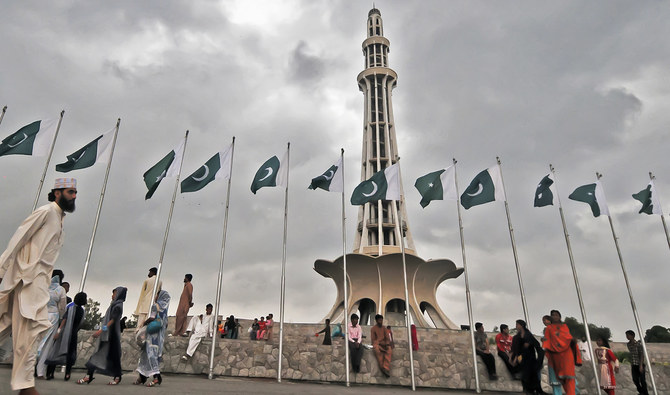LAHORE: Eighty-two years after the passing of the Lahore Resolution, Pakistanis still return each year to the iconic Minar-e-Pakistan, a tower built to preserve the spot where the draft was passed in 1940 calling for the creation of a free, Muslim nation in South Asia.
The 70-meter-tall tower was designed and supervised by Pakistani-Russian architect Nasreddin Murat-Khan who charged no fee for the project. The foundation stone for the monument was laid on March 23, 1960 and it was completed on October 21, 1968. Funds for the project were collected through a government-imposed additional tax on cinema and horse racing tickets.
Today, the minaret of the Minar-e-Pakistan provides a panoramic view of the country's second largest city and its cultural capital, Lahore, for visitors who can access the top by stairs or an elevator. A memorial rostrum has also been built on the spot where the founder of Pakistan, Quaid-e-Azam Muhammad Ali Jinnah, stood to deliver his speech during the 1940 convention of the All India Muslim League, which adopted the Lahore Resolution.
"I have been coming here since childhood," Bashir Ahmad, a visitor at the park, told Arab News on Tuesday, a day before March 23.
"Whenever I look at Minar-e-Pakistan, it gives me a feeling as if I'm looking at Pakistan."
The monument sits atop a star-shaped platform, with two flights of staircases comprising 324 steps that join on a common landing ground. The two flights were meant to symbolize the two wings of Pakistan, East and West Pakistan, when it gained independence from the British and separated from India to become a separate nation in 1947. West Pakistan is no longer part of Pakistan and became independent Bangladesh after the 1971 war.
Historian and veteran journalist Wajahat Masood said Minar-e-Pakistan had acquired” special significance” in national politics over the decades, and the ability of a political party or government to hold a successful rally at the venue, based in the Greater Iqbal Park, “resonates with the All-India Muslim League’s convention in the political consciousness of the nation.”
"A final jalsa here usually marks the crescendo of a political campaign or narrative, like Benazir’s return in 1986 and even Imran Khan’s 2011 rally," he told Arab News, referring to two separate rallies by former Prime Minister Benazir Bhutto and the current premier.
"Every national party loves to end their campaign here but they dread having a flop show here too."
For some, however, the Greater Iqbal Park is just a place to catch some sleep in the shadow of the Minar.
“I've spent many years sleeping in these lawns," a daily wager from Sahiwal who identified himself by his first name, Azmat, said, "so I take this place as my second home.”
















